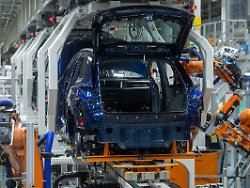Friday 19th November 2021
Lessons from the chip crisis
Car makers are becoming more and more inventive
The chip crisis is leaving deep marks on the car companies. Millions of cars worldwide are not built because the important parts are missing. The scarcity is now forcing companies to rethink. “For many years, security of supply with semiconductors was not an issue,” says Ondrej Burkacky, an expert at McKinsey. “The industry relied on it always going to be this way.” That has changed in the meantime. Companies from Daimler to Volkswagen are turning their supply chains upside down and thinking in completely new directions. The following is an overview of which strategies are being used:
Closer relationships with suppliers
The first point of contact for car manufacturers is traditionally the large suppliers – Bosch or Continental, the so-called Tier 1 suppliers. They themselves buy many parts from tier 2 suppliers, who in turn stock up on the large chip manufacturers in the Far East, for example. In some cases, automakers lacked transparency in the supply chain, says McKinsey expert Burkacky. “There was the fallacy of thinking that you had a choice between two suppliers, but the truth is that they both had the chips made in the same foundry.”
But that is changing now, says Daimler Purchasing Manager Markus Schäfer. The Stuttgart-based company has now set up a direct line of communication with all chip suppliers, including wafer producers in Taiwan, he said at the IAA auto show in September. VW boss Herbert Diess speaks of “strategic partnerships” that his company is entering into with manufacturers in Asia. Chip suppliers would have to be assessed as strategically important in the future, said Stefan Bratzel from the Center for Automotive Management. The networking of vehicles is becoming increasingly important. “You have seen the problems that arise when you treat the chip companies as any number of suppliers and stop the calls.”
Burkacky mentions further changes in the purchasing strategy. Direct investments in production or longer contracts with terms of more than 18 months are considered. “Not much of that has been implemented yet,” he says. “If the discussion had taken place two years ago, it would probably not have occurred to anyone that such measures were necessary.”
New constructions, new software
But not only the purchasing departments are in demand during the chip crisis. The developers also do their part. As with the VW commercial vehicle subsidiary Traton: According to CFO Annette Danielski, the company is trying to empty the motherboards of the control systems a little. “If we change the software, we can use fewer semiconductors and achieve the same functionality,” she said. “That sometimes takes a long lead time because the regulatory authorities intervene.
But there are areas where something can be changed quickly. “Daimler relies on new designs of the control units. These are constructed from the start in such a way that not only a specific chip is installed, but that there is an alternative to which in the event of delivery problems could be avoided, said Head of Purchasing Schäfer. Tesla is a role model. The company has managed to reprogram the software within three months so that other chips can be used that are not quite as scarce. The US is using this strategy -E-Auto-Bauer has come through the crisis better than many other manufacturers.
GM announced that it would work with chip manufacturers mainly from the USA – such as Qualcomm, STM, but also Infineon – to develop microcontrollers that combined several functions previously controlled by individual chips. “We are trying to create an ecosystem that is more resilient, more expandable and always available,” explained a company spokesman.
Production in stockpile
At short notice, the carmaker is stockpiling. BMW calls this “hole shoring”: the whole car is built, except for the missing part, and can then be completed relatively easily when it comes. Other automakers are also using this strategy. Sometimes vehicles are delivered without certain functions controlled by chips.
In addition, the semiconductors are mainly used for high-quality cars, such as electric cars, while customers have to be prepared for even longer waiting times for low-priced combustion engines. A strategy that is slowly reaching its limits: VW recently had to temporarily stop the production of electric cars in Zwickau. It will take some time until the chip jam is resolved. McKinsey expert Burkacky says it is still too early to draw a conclusion. “The bill will be presented in mid or late 2022, when you can see who came out of the crisis well and who did not make it so well.”
